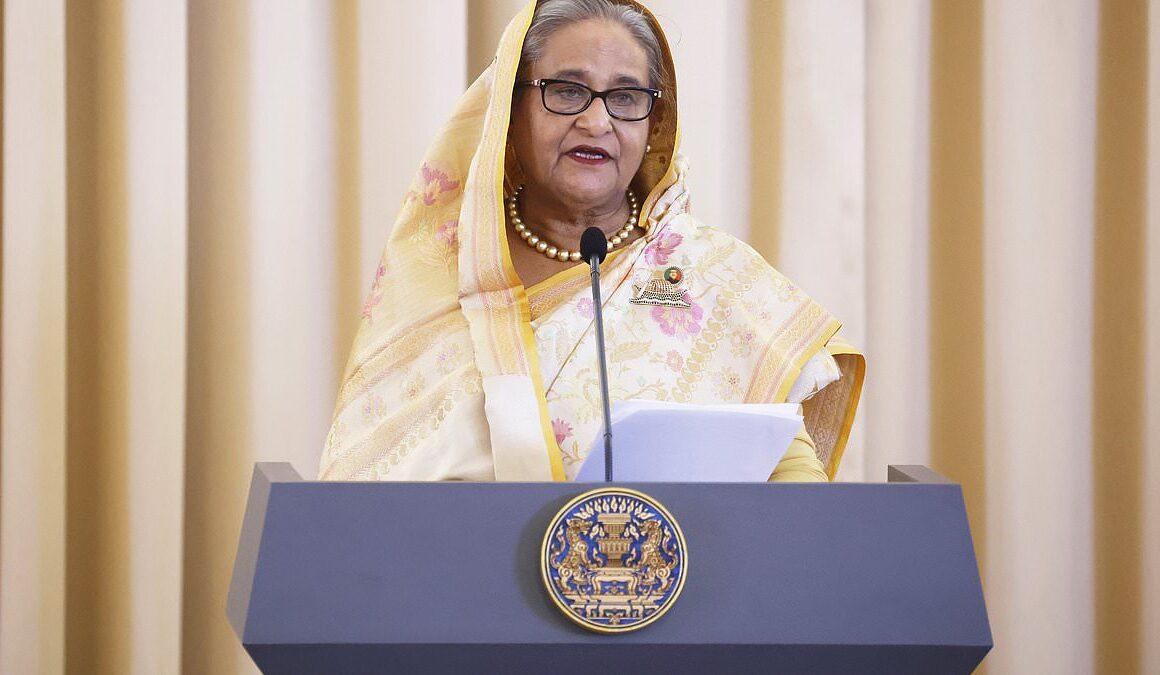Bangladesh has been all but torn apart over the past few weeks by a vicious crackdown on civil unrest by the country’s government.
Protests spearheaded by students, which began in early July following the country’s Supreme Court‘s decision to reinstate mandatory quotas for government jobs to go to the descendants of freedom fighters who helped forge the South Asian country in the 1970s, were met with fierce resistance from authorities.
From the get-go the government, headed up by 76-year-old Sheikh Hasina, tried to suppress information by shutting down universities.
When that didn’t work, they deployed militants who quickly began slaughtering demonstrators, before the police, army and border guard were called in to join them.
The ‘Iron Lady’s’ government declared a nationwide shoot-on-sight policy, which has killed more than 210 and left tens of thousands injured.
The government’s harsh crackdown on dissent is part of a long pattern of autocratic behaviour from the world’s longest serving female head of state, which includes mass arrests and the systematic use of ‘disappearances’ and extrajudicial killings, though this has consistently been denied.
Hasina, who resigned today and fled to London following the weeks of unrest, learned much of her authoritarian statecraft from her father, the country’s first leader, Sheikh Mujib Rahman.

Sheik Hasina (pictured) resigned today and fled to London following the weeks of unrest

Bangladesh has been all but torn apart over the past few weeks by a vicious crackdown on civil unrest by the country’s government

Bangladeshi citizens were seen climbing over the prime minister’s residence
Rahman ruled the nation with an iron fist, using one-party socialist rule to ensure he had a significant level of control over the flow of information, and amended the constitution to gradually increase his ability to make changes.
He banned the free press in the country, allowing just four state-owned newspapers to operate.
In 1975, just three years after the state of Bangladesh was officially set up, her father was assassinated in a military coup.
That fateful night, while 28-year-old Hasina was in Germany with her younger sister, a group of army officers burst into the family’s home in the capital, Dhaka, and slaughtered her parents, three other siblings and the household staff – 18 people in all.
One analyst previously said this was a catalytic moment for the leader, pushing her to consolidate power at any cost.
‘Hasina has one very powerful quality as a politician – and that is to weaponize trauma,’ Avinash Paliwal, a former university lecturer who specialised in South Asian strategic affairs, said in January ahead of the general election.
She lived in exile for several years in India, which had supported Bangladesh in its independence movement against Pakistan, before going back to her home country and taking over the Awami League, the country’s oldest political party.

She is the daughter of the country’s first leader Sheikh Mujib Rahman

The authoritarian leader has faced calls to resign for weeks

Her government is accused of extrajudicial killings

Men run past a burning vehicle inside the Bangabandhu Sheikh Mujib Medical University Hospital, set on fire by protesters

A rickshaw puller rides in the smoke caused by a burning shopping center which was set on fire by protesters during a rally against Prime Minister Sheikh Hasina
Perhaps because of her role as leader of one of the country’s biggest political parties, and because she had the capacity to take revenge against the military men who killed her family, the army sporadically kept her detained in her home throughout the 1980s.
But in 1996, she won the coveted role of prime minister.
Hasina’s struggles, however, were far from over.
She fought bitterly with her former prime minister Khaleda Zia, the chief of the main opposition Bangladesh Nationalist Party, who’s now ailing and under house arrest, for around a decade.
The two women ran the country alternatively for years in a bitter rivalry that all but tore the nation apart.
Hasina has often accused the BNP of courting hard-line extremists that her party, which calls itself moderate and secular, had worked to stamp out, while Zia’s BNP claims the Awami League is using oppressive tactics to stay in power.
The two traded blame as the recent protests turned violent. The BNP, which backed the student protesters, repeated calls for Hasina to step down while she accused them of stoking the violence.
She said the protests had been overtaken by the BNP and another opposition party that her government banned recently.

Prime Minister Sheikh Hasina (C) weeps while she visits a metro station in Mirpur vandalized by students during the anti-quota protests

Anti-government protestors vandalise the Bangabandhu Memorial Museum as they set it on fire, in Dhaka on August 5, 2024

Anti-government protestors celebrate in Shahbag near Dhaka university area in Dhaka on August 5, 2024
After Hasina lost the general election in 2001, she became the leader of the opposition. Political violence, unrest and military interventions marked the years until she was reelected.
Back in power, she fixed her sights on the economy and built infrastructure previously unseen in Bangladesh: a strong electricity grid that reaches far-flung villages and big-ticket projects such as highways, rail lines and ports.
The country’s garment industry became one of the world’s most competitive.
The development gains sparked other advances. Girls were educated on par with boys, and an increasing swell of women joined the workforce. Those close to her described Hasina as hands-on and passionate about uplifting women and poor people.
But despite the largely beneficial economic decisions she made, many nations expressed serious concerns over her government’s violations of human rights and press freedoms.
In January this year, after she won a fourth consecutive term, the US and the United Kingdom said the polls were not credible, free and fair. Previous elections in 2018 and 2014 were also marred by allegations of vote rigging and a boycott by opposition parties.

Students shout slogans during ongoing anti-quota protest in Dhaka on July 18, 2024

Smoke rises from the burning vehicles after protesters set them on fire near the Disaster Management Directorate office, during the ongoing anti-quota protest in Dhaka on July 18, 2024


Protests over the past few weeks have been violent
Her critics for years accused her government of using harsh tools to muzzle dissent, shrink press freedoms and curtail civil society. Rights groups have also cited forced disappearances of critics, which her government denied.
Her government employed the same heavy-handed approach when these protests began, which inflamed tensions even more, analysts said.
The student-led movement also came as Bangladesh underwent an economic churn given the recent global slowdown. Ahead of the January polls, there was labor unrest and dissatisfaction with the government.
But the latest furor highlighted the extent of economic distress in the country, where exports have fallen and foreign exchange reserves are running low. Experts say there’s a lack of quality jobs for young graduates, who increasingly seek the more stable and lucrative government jobs.
‘There have been plenty of protests during Awami League’s regime over the last 15 years, but nothing as large, long, and violent as this one,’ said Michael Kugelman, director of the South Asia Institute at the Wilson Center.
He added that the especially ferocious government response of excessive force and deep pent-up anger at the state as well as growing economic stress led to the escalation.

Bangladesh Prime Minister Sheikh Hasina speaks at the opening session in the national parliament in Dhaka on Sunday, July 14, 1996

Protestors continue their demonstration for the abolition of the quota system in government jobs, on August 05, 2024 in Barishal, Bangladesh


Bangladeshi citizens were seen weeping with joy following Hasina’s resignation
After nearly two decades of her rule, the country is jubilant, if deeply unsure on what to do next following her resignation and escape to London.
Shortly after she was seen on TV boarding a military helicopter with her sister, the country’s military chief, General Waker-uz-Zaman, said he would seek the president’s guidance on forming an interim government.
He promised that the military would launch an investigation into the deadly crackdown on student-led protests that fueled outrage against the government.
‘Keep faith in the military, we will investigate all the killings and punish the responsible,’ he said. ‘I have ordered that no army and police will indulge in any kind of firing.’
‘Now, the students’ duty is to stay calm and help us,’ he added.
Thousands of protesters celebrated in the capital, waving Bangladeshi flags as the news broke, while others looted her official residence, carrying out furniture and even fish from the kitchens.
It is an ‘end of a regime that delivered a lot of development but was increasingly authoritarian, as we saw with the mass killings these past weeks,’ said Naomi Hossain, a research professor specializing in Bangladesh at the London-based SOAS University.
The country has seen interim governments in the past, Hossain said, adding that for now the hope is that the army will ensure peace.
But there are fears of reprisal violence. ‘It could get ugly if the army isn’t able to calm people down and defuse the issue. It could be a while before we are out of the woods,’ she added.










